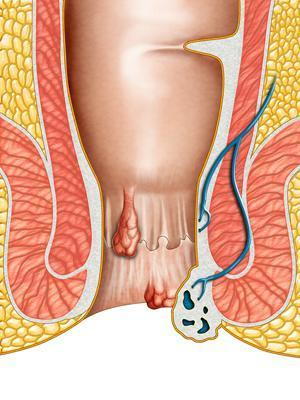
Are you experiencing periodic pain, itching or have blood when you wipe after a bowel movement? If so, you could have hemorrhoids. Hemorrhoids are a condition resulting from swelling and distention in the veins of the anus and rectum. Hemorrhoids are one of the most common causes of rectal bleeding, and the condition isn’t considered serious or life-threatening. In fact, some cases of hemorrhoid may clear up on their own within a few weeks. Of course, if you are noticing any blood in your stool it’s important that you contact your physician to evaluate the cause of your bleeding.
Hemorrhoids may be either internal or external. Internal hemorrhoids are inside the rectum. Often times the only symptom of internal hemorrhoids is bright red blood when wiping after a bowel movement. Itching and mild discomfort are also frequent. External hemorrhoids are usually more painful because they are found around the anus rather than inside the rectum. Besides pain, these hemorrhoids can also cause bleeding.
What causes hemorrhoids?
Straining during a bowel movement, standing or sitting for long periods of time, or having constipation or diarrhea can also bring on hemorrhoids.
Excess pressure placed on the rectum can increase your chances for hemorrhoids. This might be the case if you are overweight, or are pregnant.
Genetics can play in role in whether or not you develop hemorrhoids; therefore, if a family member deals with them then you are more likely to deal with them, too.
Can you prevent hemorrhoids?
There are certain habits you can adopt to reduce your chances of getting hemorrhoids. This includes:
- Getting enough fiber every day
- Drinking water
- Getting regular exercise
If you are prone to hemorrhoids, then talk to your doctor about ways to change your diet or lifestyle to reduce your risk.
How are hemorrhoids treated?
Most of the time you can alleviate your symptoms and treat hemorrhoids with simple at-home measures such as:
- Incorporating more fiber into your diet
- Using a short course of over-the-counter hemorrhoid cream (topical steroids)
- Soaking in warm water (sitz bath)
- Avoiding dry toilet paper
- Applying a cold compress to the area
- Taking over-the-counter pain relievers
Most people will see hemorrhoid symptoms disappear in about a week. If you are still experiencing symptoms after a week or if you are experiencing severe symptoms, then you need to contact your care provider to discuss options. For internal hemorrhoids, a team of GI Associates gastroenterologists offers the CHR O’Regan treatment system. Performed in the office, this minimally invasive procedure requires no prep and no sedation and patients return to work the same day.
Symptomatic external hemorrhoids may require surgery to remove the veins causing the symptoms. If you have been diagnosed or are suspicious of underlying internal hemorrhoids give GI Associates in Wausau, WI, a call. We would be happy to schedule an evaluation for you.
